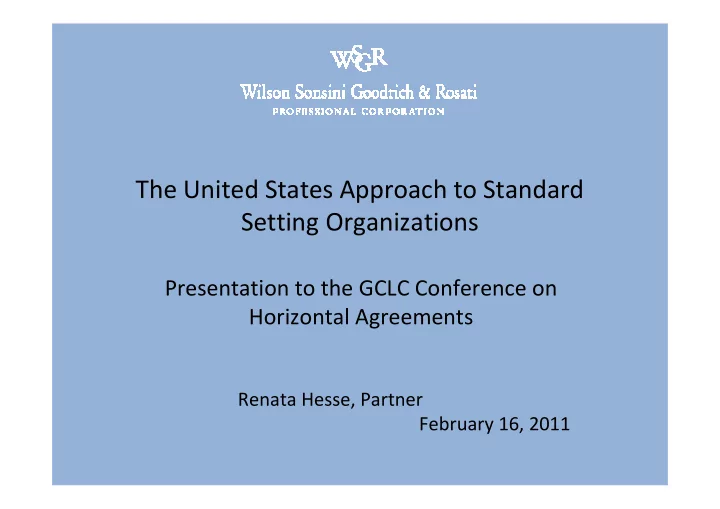

The United States Approach to Standard Setting Organizations Presentation to the GCLC Conference on Horizontal Agreements Renata Hesse, Partner February 16, 2011
Operative Legislation The Sherman Antitrust Act § 1: "Every . . . conspiracy in restraint of trade or • commerce . . . is . . . illegal.“ The Sherman Antitrust Act § 2: "Every person who shall monopolize, or attempt • to monopolize . . . any part of the trade or commerce among the several States, or with foreign nations, shall be deemed guilty of a felony.” Federal Trade Commission (FTC) Act § 5: “Unfair methods of competition in or • affecting commerce, and unfair or deceptive acts or practices in or affecting commerce, are . . . unlawful.” To be “deceptive,” an act requires (1) a material representation, omission or practice that is likely – to mislead the consumer and (2) a practice directed towards a specific consumer or group of consumers.
Private Enforcement Allied Tube & Conduit Corp. v. Indian Head, Inc., 486 U.S. 492 (1988) • An SSO cannot validate the anticompetitive activities of its members simply by adopting rules that – fail to provide safeguards sufficient to prevent the standard setting process from being biased by members with economic interests in restraining competition. Broadcom Corp. v. Qualcomm Inc. , 501 F.3d 297 (3d Cir. 2007) • Actionable anticompetitive conduct exists when : – The standard is agreed upon in a consensus-oriented environment • The patent holder’s intentionally false promise to license essential proprietary technology • on FRAND terms induces the SSO to incorporate the technology into the standard The patent holder subsequently breaches its promise and demands license fees • Even if the SSO’s intellectual property rights policy does not impose a duty to disclose, the courts – may be willing to rely on the understanding of the SSO participants that such a duty existed.
FTC Enforcement Rambus Inc. v. FTC, 522 F.3d 456 (D.C. Cir. 2008) • The FTC initially ruled that Rambus violated FTC Act §5 by failing to disclose relevant patents and – patent applications to the relevant SSO. The Court of Appeals for the District of Columbia reversed this decision in finding Rambus’ lack of – disclosure to be immaterial. According to the court, there was no evidence that the SSO would not have standardized on Rambus’ technology even if it were aware of the patents. In re Negotiated Data Solutions, LLC, File No. 051-0094 (2008) • The FTC determined that, by refusing to honor a licensing commitment made by a predecessor in – interest, N-Data’s actions threatened to raise overall industry prices and to “subvert” the viability of the standard setting process generally. If permitted, this conduct would adversely affect entire industries as SSOs would seek to avoid incorporating patented technologies for fear of a similar hold-up. The FTC’s decision against N-Data relied solely on FTC Act § 5. Previous decisions (Dell, Rambus, – Unocal) had tethered § 5 allegations with Sherman Act § 2 claims.
Issues in SSO Enforcement Today Obligations to Maintain FRAND Commitments • Uncertainty over what is a FRAND commitment – Compare Article 101 Guidelines para. 288 (SSO does not have to verify that agreed-upon • licensing terms fulfill FRAND commitments) – The Guidelines discuss options for parties who believe that IP is not being licensed on FRAND terms, including mediation (para. 290) and litigation (para. 291) Successor obligation to define FRAND in similar terms as predecessor – Compare Article 101 Guidelines para. 285 (imposing a requirement on successors to keep • purchased IP available on FRAND terms) Patent Ambush/Hold-Up • Obligation of patent holder to notify SSO of continuing application affecting standard – Compare Article 101 Guidelines para. 285 (requiring IP owners seeking to include their IP in • standard to promise in writing to provide technology on FRAND terms) Obligation of patent holder to notify SSO of “submarine patents” – patent applications that have – been filed but that have not been granted Compare Article 101 Guidelines para. 286 that requires “a good faith disclosure” by • participants who might own essential IP for the standard under development
Patent Pools A patent pool exists when two (or more) companies agree to cross-license • patents relating to their particular technology. The creation of patent pools provides third parties a convenient forum in which to one-stop-shop – for all the intellectual property necessary to create a product Problems with patent pools arise in a number of areas: • Inclusion of non-essential patents in the patent pool – Inclusion of patents within a patent pool that, but for the agreement, would have otherwise – competed (non-blocking patents) Refusal of patent pools to permit individual licensing of patents contained within the pool in an – attempt to restrict development of technology that competes with the pool Creation of patent pool in response to competitor action to limit competitor from utilizing its – technology without license Enforcement of patent pool rights against end users of supposedly infringing material rather than – the distributor of supposedly infringing material
Recommend
More recommend